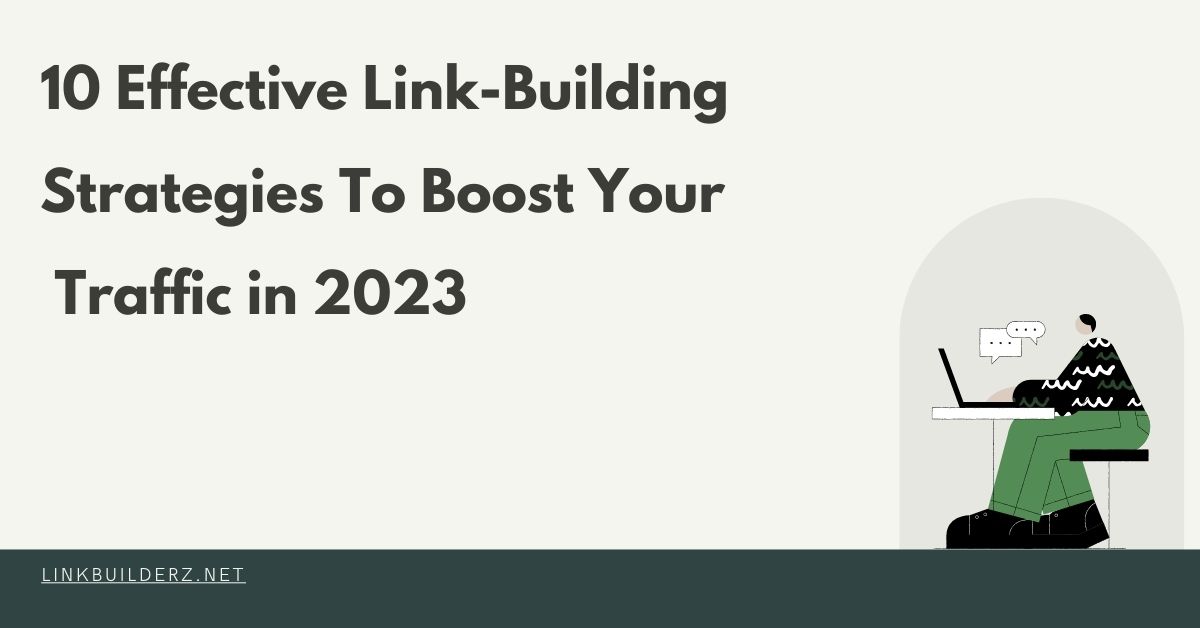
Launching a website is the initial step in your journey of SEO. The real challenge lies in securing a prominent position in the Search Engine Results Pages (SERPs).
You can improve your website ranking in the SERP through link building. As it plays a pivotal role in enhancing your website’s visibility and attracting organic traffic. By establishing a strong network of quality backlinks, you can strengthen your online presence and reach your target audience effectively.
In this comprehensive guide, we have discussed ten foundational link-building strategies that can significantly boost your traffic and propel your website to new heights. These strategies encompass a range of techniques, from content creation and outreach to social media engagement and competitor analysis.
By implementing these strategies strategically and consistently, you can drive targeted traffic, improve your online authority, and generate more conversions for your business.
Basics of Backlinks
Backlinks are incoming hyperlinks from one website to another. They are a fundamental aspect of SEO and play a crucial role in determining a website’s authority, credibility, and search engine rankings.
Search engines view backlinks as a vote of confidence and use them to assess a website’s relevance and quality. Websites with a higher number of quality backlinks tend to rank higher in search engine results pages (SERPs).
Types of Links
In the realm of link building, there are two primary types of links:
- Do-follow
- No-follow
Do-follow links possess the ability to pass on their link juice or PageRank to the targeted page, thereby boosting its SEO standing.
On the other hand, no-follow links refrain from transferring their link juice, yet they don’t impede visitors from clicking on them.
Without a further due let’s take a quick look on link building strategies which increase traffic.
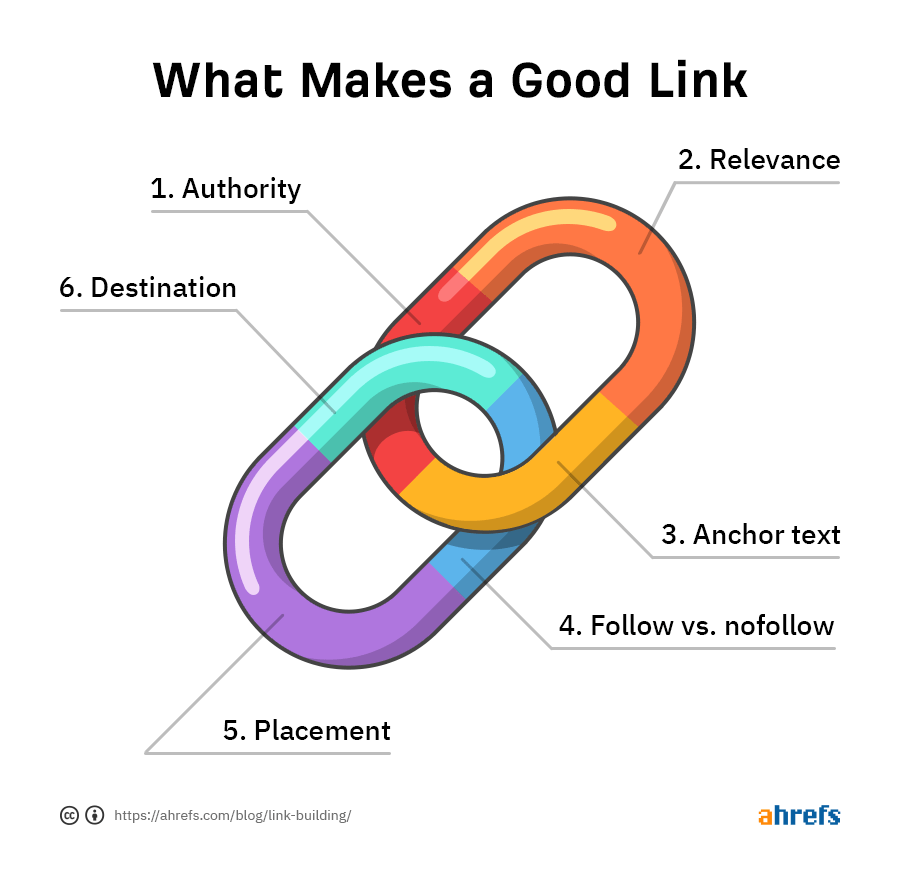
1. Create High-Quality Content
The foundation of any successful link-building campaign depends on high quality content. Content that is unique, valuable, and shareable naturally attracts backlinks from reputable websites in your industry.
Focus on crafting blog posts, articles, whitepapers, case studies, and infographics that provide insights, actionable tips, and thought leadership. Engage your audience by addressing their pain points, providing solutions, and offering fresh perspectives on industry-related topics.
Your content should be well-researched, data-driven, and easy to read, ensuring that it resonates with your target audience. Additionally, optimize your content for relevant keywords to improve its search engine visibility.
Once you have created compelling content, promote it through various channels. Share your articles and blog posts on social media platforms, email newsletters, and relevant online communities.
Encourage your audience to share your content, increasing its reach and potential for acquiring backlinks. By consistently producing exceptional content, you establish your website as a trusted resource, encouraging other websites to link to your valuable content.
2. Guest Blogging
Guest blogging is an effective technique to secure high-quality backlinks from authoritative websites. Identify influential blogs and websites in your industry that accept guest contributions.
Develop a list of target websites that align with your niche and have a significant readership. You can use Google Search Operators for making a list of target websites. Here’s how you can use different operators
“[your keyword]” + “write for us”
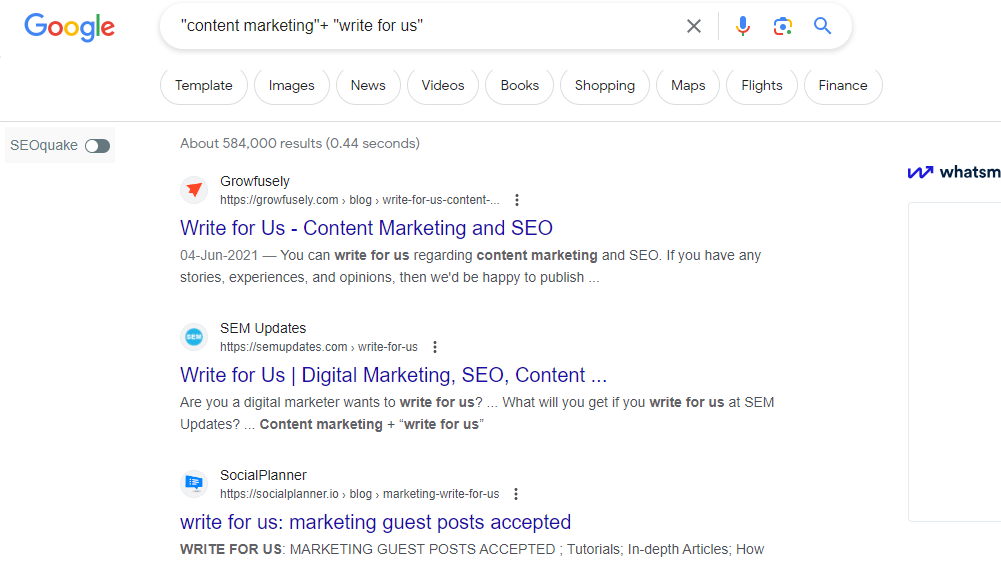
“[your keyword]” +”guest post”
“[your keyword] + “guest post guidelines”
“[your keyword]” +”become a contributor”
“[your keyword]” +”contribute”
“[your keyword]” +”submit a guest post”
“[your keyword]” + “guest post guidelines”
“[your keyword]” +”become a contributor”
“[your keyword]” +”contribute”
- Before pitching your guest post ideas, familiarize yourself with the target website’s content and audience to ensure your contributions are relevant and valuable.
- Craft unique and well-researched articles tailored to each target website. Ensure your content provides actionable insights, addresses common challenges, and offers solutions to the target website’s audience. While crafting your guest post, incorporate relevant links to your website in a natural and non-promotional manner. These links can be included within the body of the article or in the author’s bio section.
- When reaching out to website owners or editors with your guest post pitch, personalize your message and explain why your content would be beneficial to their audience.
- Once your guest post is published, promote it across your social media channels and engage with readers who comment on the post. This interaction not only enhances your online presence but also encourages other websites to link back to your content.
3. Build Relationships with Influencers
Establishing relationships with influencers and thought leaders in your industry can significantly amplify your link-building efforts. Identify key influencers who have a substantial online presence and a large following in your target market.
Engage with them on social media platforms by sharing their content, commenting on their posts, and mentioning them in your own content when appropriate. Building these relationships requires genuine interaction and value exchange.
There are 2 ways you can acquire backlinks
- Reach out to influencers and offer to collaborate on content creation, such as co-authoring blog posts, conducting interviews, or hosting joint webinars. By leveraging their expertise and reputation, you can attract more attention to your website and earn valuable backlinks from their websites. When influencers endorse your content or products, their followers are more likely to visit your website, resulting in increased traffic and brand exposure.
- Additionally, consider inviting influencers to contribute guest posts or provide quotes for your own content. Their association with your brand adds credibility and increases the likelihood of attracting backlinks from their followers and other industry websites.
4. Harness the Power of Social Media
Social media platforms offer immense opportunities to promote your content, engage with your audience, and attract backlinks. Develop a strong presence on platforms that are most relevant to your target audience, such as LinkedIn, Twitter, Facebook, and Instagram.
Create compelling profiles that reflect your brand’s personality and values, and consistently share valuable content that resonates with your followers.
Share your blog posts, infographics, case studies, and other valuable content across your social media channels. Craft attention-grabbing headlines and use eye-catching visuals to capture the interest of your audience.
Encourage social sharing by including social sharing buttons on your website and within your content. When your content is shared, it increases the chances of earning backlinks as other websites reference and link back to your original piece.
Engage with your audience by responding to comments, questions, and mentions. Participate in relevant industry conversations and join industry-specific groups and communities.
By actively participating and providing insightful contributions, you establish your brand as an authority and increase the likelihood of attracting backlinks from engaged community members.

5. Resource Link Building
Resource link building involves identifying resource pages or link roundups within your industry and requesting to have your website or service included.
These resource pages typically list tools, software, or valuable resources that are relevant to their audience.
To find such opportunities, use search operators like
“industry keyword + resources”
“best tools for [industry]”
“recommended software for [industry]”
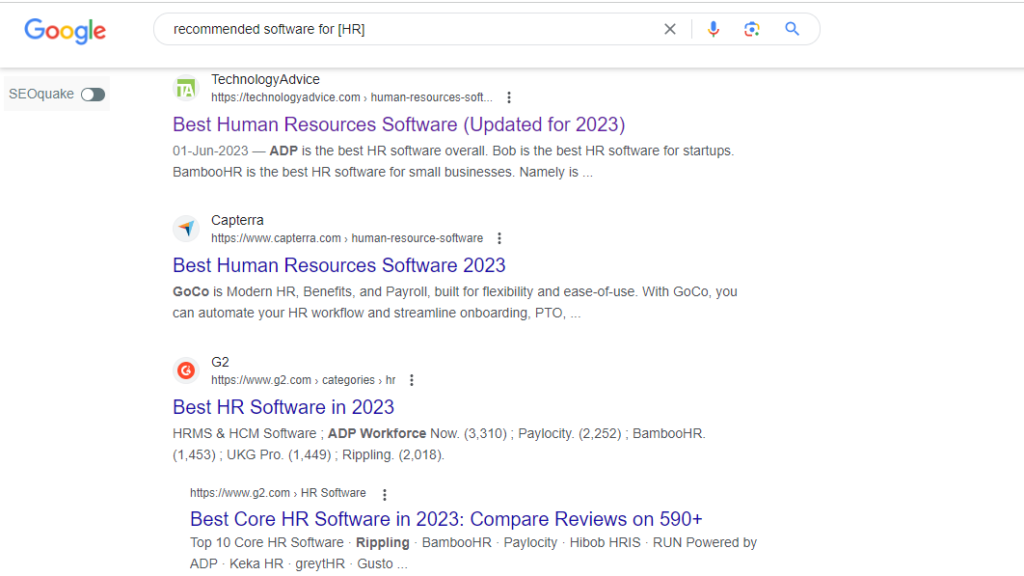
Review the identified resource pages and check if your product or service is a good fit.
When reaching out to website owners or authors, personalize your outreach message and explain why your business or service should be included.
Highlight its unique features, benefits, and value to their audience. Emphasize how your inclusion would enhance their resource page by providing an additional solution or resource.
A well-crafted outreach email can increase the chances of getting featured on these resource pages and attract valuable backlinks from reputable websites in your industry.
6. Broken Link Building
Broken link building is a tactic that involves identifying broken links on authoritative websites and offering a relevant replacement link to your content. This strategy benefits both the website owner, who can fix the broken link, and you, who gain a valuable backlink.
To find broken links, use tools like
Check My Links
Broken Link Checker
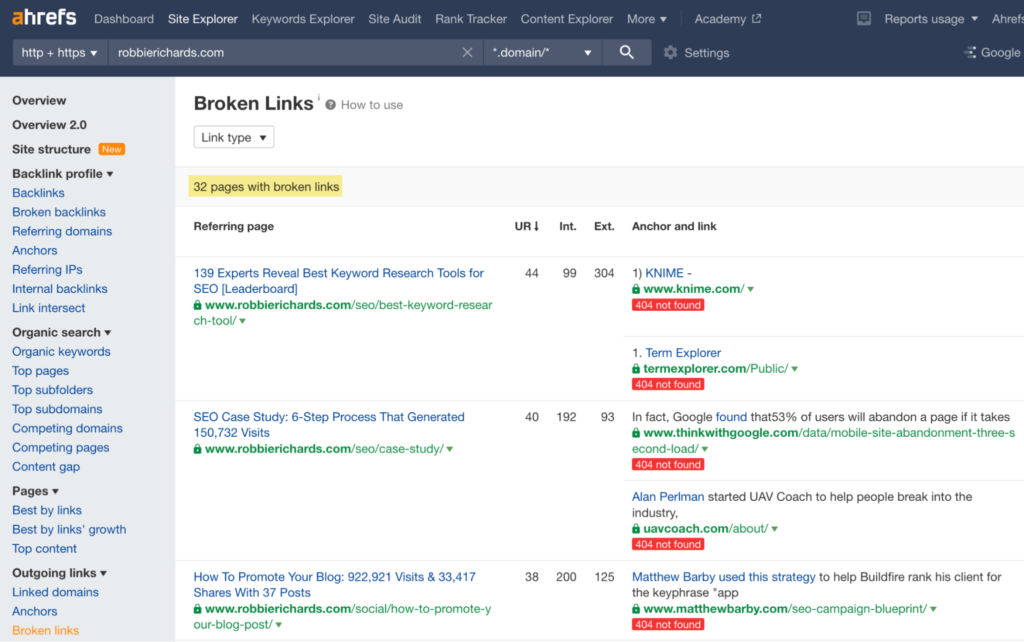
Once you’ve identified broken links on relevant websites, create high-quality and relevant content that can serve as a replacement for the broken link. Ensure that your content provides similar or superior value compared to the original link.
Reach out to the website owner or webmaster, notifying them about the broken link and suggesting your content as a replacement.
Be polite, informative, and concise in your outreach message. Highlight the relevance and value of your content and how it would benefit their audience.
By offering a solution to their broken link, you increase the chances of securing a backlink to your content.
7. Create Link-Worthy Infographics
Infographics have a unique ability to capture attention, convey information in a visually appealing manner, and encourage sharing. When you create compelling infographics that provide valuable insights or present data in an engaging way, they are more likely to be shared and linked to by other websites.
To maximize the link-building potential of your infographics, make sure to include an embed code alongside them. This makes it easy for other websites to share your infographic on their own pages while providing proper link attribution.
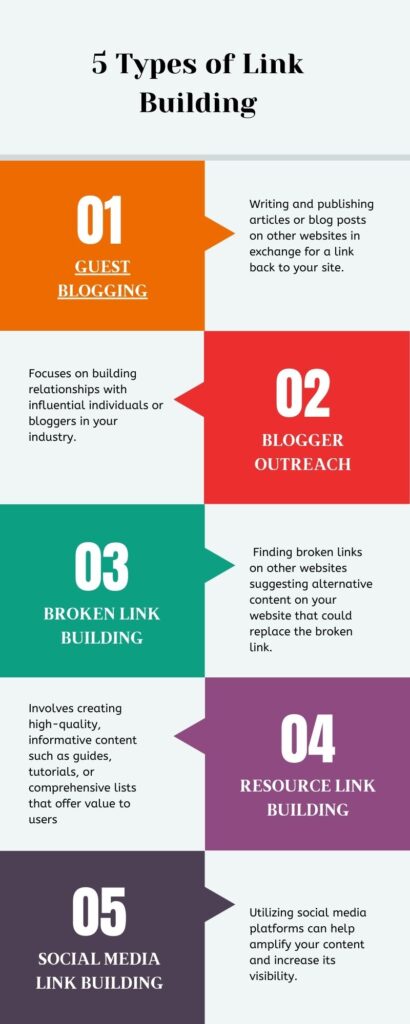
By allowing others to embed your infographic on their websites, you increase the chances of acquiring backlinks from those sites.
8. Participate in Industry Forums and Communities
Engaging with relevant industry forums, discussion boards, and online communities is an excellent strategy to establish yourself as an authority and attract backlinks.
By actively participating in these platforms, you can share your expertise, answer questions, and provide valuable insights to fellow industry professionals and enthusiasts.
When engaging in these communities, be sure to include links to relevant content from your website when appropriate.
However, it’s crucial to focus on providing genuine value rather than overly promoting your own content.
By establishing yourself as a reputable source and consistently contributing valuable insights, you enhance your credibility and increase the likelihood of others linking back to your content naturally.
9. Monitor Competitor Backlinks
Analyzing the backlink profiles of your competitors can unveil valuable link-building opportunities for your website.
By identifying websites that link to your competitors but not to your own, you can develop a targeted approach to reach out and secure similar backlinks.
You can use different tools like ahref for hunting the backlinks of your competitor.
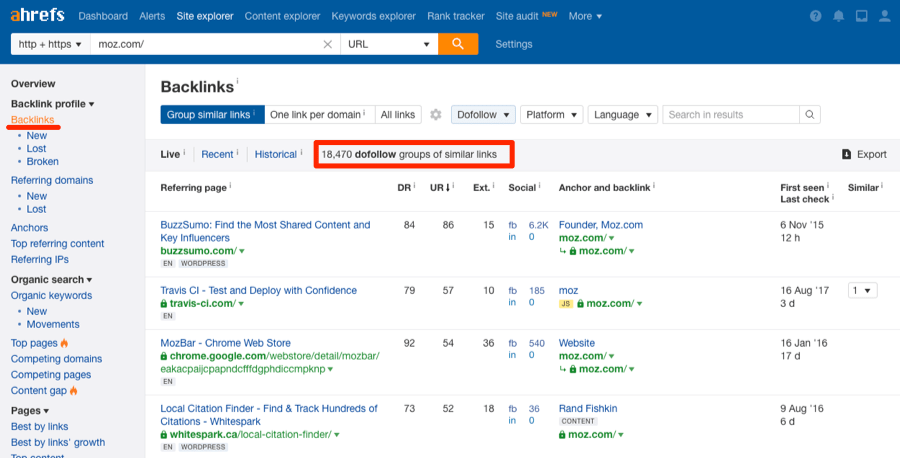
Research and analyze the websites linking to your competitors to determine their relevance and authority. Consider reaching out to these websites, showcasing your unique value proposition, and explaining how your content or offerings can provide additional value to their audience.
By presenting a compelling case for why they should consider linking to your website, you increase the chances of securing valuable backlinks that can boost your traffic and search engine rankings.
10. Invest in PR and Content Promotion
Investing in public relations (PR) efforts and content promotion can significantly enhance your link-building strategy. By getting your website featured in industry publications, news outlets, and authoritative websites, you can attract high-quality backlinks from reputable sources.
Develop relationships with journalists, reporters, and influencers who cover your industry. Pitch them newsworthy stories, press releases, or thought leadership pieces related to your company or industry trends. By positioning yourself as a valuable resource, you increase the likelihood of getting featured and gaining valuable backlinks.
Additionally, consider promoting your content through paid channels such as sponsored posts or native advertising. These strategies can help increase the reach of your content, attract more visitors to your website, and generate backlinks from websites that discover and share your content.
Remember to approach PR and content promotion strategically, focusing on relevant and reputable outlets that align with your target audience and industry.
Conclusion
Implementing effective link-building strategies is essential for any website aiming to boost website traffic and increase online visibility.
By creating exceptional content, leveraging guest blogging, building relationships with influencers, utilizing social media, and adopting other foundational strategies, you can attract high-quality backlinks and improve your search engine rankings.
Remember that link-building is an ongoing process, and success lies in consistently implementing these strategies, measuring results, and adapting your approach as needed. With dedication and a well-executed link-building plan, your business can drive targeted traffic, increase conversions, and achieve long-term success in the digital marketplace.
